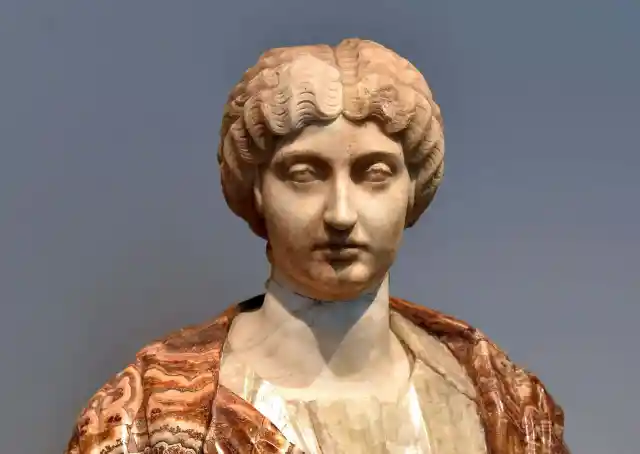1. She had large shoes to fill
Faustina was faced with a haunting task of living up to her mother's remarkable reputation. Her mother, Annia Galeria Faustina, was an loved and respected Roman empress who left behind an impeccable legacy. She dutifully served her role, earning immense love and respect from the people and the loved she showered on them cam back as they gave her the prestigious title of "Augusta" – the highest honor for a woman at that time. Faustina's father even declared her mother a goddess.
However, despite the challenge of being compared to her mother's greatness, young Faustina possessed a unique quality that set her apart from everyone else.


2. Born with fortune, born with luck.
Child mortality in Rome was significantly higher than in the rest of modern society during the time when Faustina was born in 130 AD. The chances of babies surviving into childhood were extremely low so if a baby did get to grow up to childhood it was considered a miracle .
Faustina was the sole child of her parents who managed to reach adulthood. Not only was Faustina lucky to be alive, but being in Rome further added to her luck. It seemed that fortune had favored her...at least for the time being.


3. She experience the peaceful Rome
During her birth, Rome witnessed a period known as the "Pax Romana" by historians. Although they maintained their suppression of enemy nations and cultures, Rome enjoyed internal tranquility and peace, characterized by peaceful transitions of power between emperors.
Nevertheless, this era eventually concluded, and it is possible that Faustina played a significantly unsettling role in bringing an end to the peaceful and grand Roman rule.
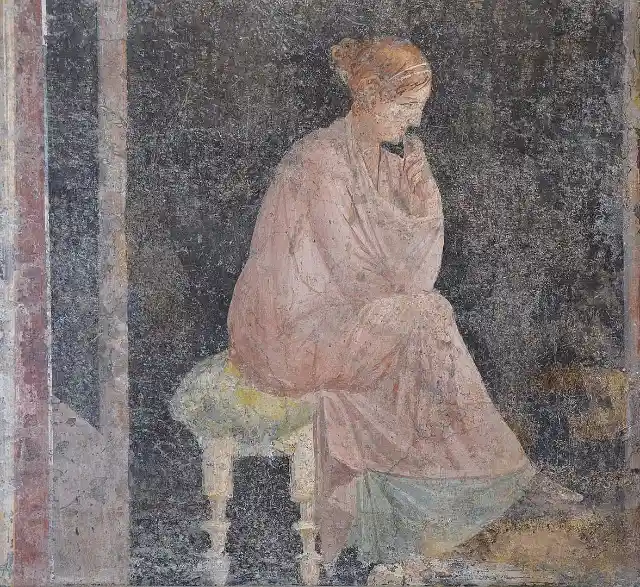

4. She had no freedom or right of her own
Faustina was deprived of the opportunity to shape her own future since the beginning, all the decisions were taken for her since a young age. Though she enjoyed a life of riches and extravagance, typical for the elite members of the grand Roman empire, there was a concerning drawback to her privileged status, her freedom. She had no right over her own existence. Her father dictated her path in life, that too with chilling consequences.
Even before reaching adulthood according to modern standards, Faustina's family buried her under mature responsibilities that had lasting consequences.


5. A forced first marriage
Faustina had no control over her first marriage as it was arranged by her family. Later, her second cousin, Emperor Hadrian, decided to adopt Lucius Verus as his heir and also arranged for Faustina to marry him.
This meant that at the young age of eight, Faustina was designated as the future Roman empress. Although marrying at such a tender age was already distressing, little did she know that her marital troubles were just about to start. At the age where kids play, she was given the role of the empress and a wife


6. A taboo marriage
In just seven years following her initial marriage, Faustina's father intervened and completely disrupted her life. He terminated her engagement and arranged for her to marry Marcus Aurelius, who happened to be her cousin from her mother's side and also her adopted brother.
At that time, these circumstances didn't raise any eyebrows, despite Faustina having no say in the matter again. Naturally, according to modern standards, not only was her marriage to a relative considered taboo, but there were also other controversial aspects to their union.


7. She married her older cousin at 15
Faustina, who was 15 years old at the time, obeyed instructions and entered into a marriage with her cousin, who was almost ten years older than her. It was no less than a nightmare. There are no explicit records disclosing Faustina's thoughts and feelings about this situation, but it is likely that even if she had expressed them, her father would not have considered them seriously.
As a young teenager and future empress, Faustina now faced her next significant duty as a member of the Roman royal family.


8. She was exceptionally fertile
During this period in Rome, it was uncommon for children to survive. Therefore, any woman who was able to have multiple children was considered exceptionally fortunate. In the case of Faustina, she was remarkably fertile and gave birth to almost 14 children in a span of 21 years.
However, this constant cycle of childbirth had a noticeable negative impact on the empress and her health. Instead of bringing joy, motherhood brought sorrow and grief into her life.


9. The loss of her children
Despite spending a significant portion of her reign pregnant, Faustina experienced the tragic loss of most of her children. Over half of them passed away before reaching adulthood, which undoubtedly caused unimaginable pain and grief for both her and her husband.
Nonetheless, her ability to bear children was still regarded as successful, earning her a remarkable distinction.


10. The “ Fertile Empress ”
The "fertile empress", Faustina, was highly regarded and loved by the Roman locals for her ability to bear children. In fact, a coin was even minted in her honor, featuring an engraving of her with four children.
When Aurelius rose to the throne in 161, Faustina, his supposedly righteous and beloved wife, stood by his side. However, despite her initial appearance as the ideal empress, her actions revealed a far from perfect behavior.


11. A shaky reign
After Faustina and her husband took reign in their hands, there was a noticeable change in the Roman empire. On the one hand, the country was plagued by dangerous diseases, leading to a decline in population and negatively impacting the economy.
Rome also faced invasions from neighboring nations, while Aurelius's health started to deteriorate. The pressure from these external factors had a distinct impact on Faustina, and she responded in a scandalous manner.


12. A promiscuous lifestyle
Faustina's attitude was not always characterized by discipline. In fact, it is believed that she may have succumbed more to her desires than what some historians have documented.
Several rumors persist that she consistently engaged in passionate extramarital relationships with sailors, soldiers, and even gladiators. One such alleged affair resulted in a particularly violent outcome too.


13. Reading the book backwards
There are several rumored affairs to Faustina’s name, one of which involves her first husband, Verus, while she was technically married to Aurelius. Some may find it forgivable as Faustina was just a child when she was engaged to Verus.
However, the situation becomes less forgivable when taking into account her new familial ties to this former lover.


14. Love her own son-in-law romantically
Faustina was rumored to have had an affair with Verus while he was married to Lucilla, who happened to be Faustina's own daughter. Verus was not only Faustina's first husband, but also her son-in-law.
This situation must have created quite the drama during family meals, especially when Faustina found out that Verus had confessed the affair to his wife. Unable to bear the betrayal, Faustina chose to take drastic measures.


15. She couldn’t forgive the betrayal
According to reports, Verus was allegedly poisoned by Faustina after she discovered his betrayal. Although some accounts claim that Verus died in battle, others suggest that his demise was due to symptoms resembling food poisoning, fueling rumors that Faustina planned his poisoning.
It is possible that Verus was not the sole individual to provoke the wrath of the passionate empress Faustina and face the resulting consequences.
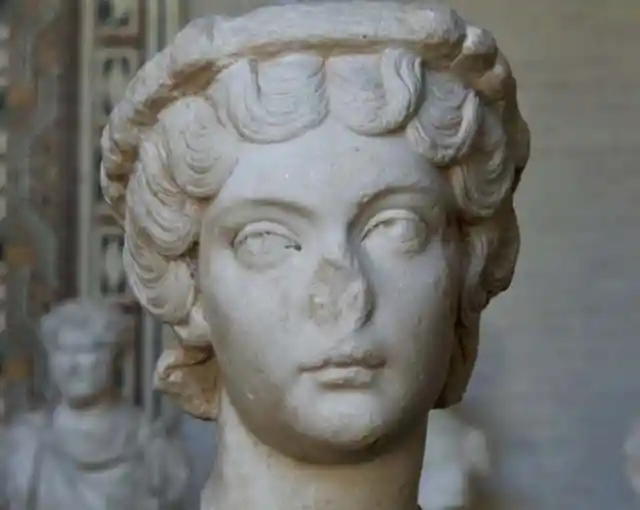

16. She was merciless
It is likely that Roman society had high expectations for Faustina, assuming she would also walk on the same path as her beloved and respected mother. However, Faustina had her own unique perspective on effective leadership.
She once stated that leaders and soldiers tend to dominate others unless they themselves are dominated. This mindset likely fueled her confidence in taking charge during critical situations.


17. She didn’t fear executing
The Roman executions were known for their horrifying nature, which included crucifixions, impalement, and sometimes even torture. Empress Faustina held significant influence in the affairs of the time, leading to rumors that she commanded the deaths of numerous people during her reign.
Although her motives are unclear, she did not hesitate to execute her enemies. While the allegations of her wicked deeds spread in Rome, the people turned to her husband for a reaction. However, Aurelius' response to his wife's offenses surprised everyone.


18. Aurelius forgave her
Faustina's husband appeared to be forgiving of her actions, while the public disapproved of Aurelius' inaction.
In fact, a critic at the time criticized Aurelius for not taking action against his wife, stating, "He tolerated the wrongdoings of others, especially his wife, without causing any commotion or seeking retribution." It is possible that Aurelius was simply being a caring husband, but then he made a completely strange decision.


19. Her lovers were influential
Faustina's husband, Aurelius defied expectations by not only forgiving her for her actions but also by often elevating her lovers to influential positions. Despite his immense authority as emperor, Aurelius chose to honor them rather than ordering their execution.
While this may have appeared as a display of weakness on Aurelius' behalf, Faustina unfortunately discovered that he had ulterior and self-centered motives and the cost of Faustina herself.


20. She was just a financial obligation
Aurelius viewed the financial support of his wife as a necessary obligation. He considered her an essential part of the agreement he made to gain control of the Roman empire. Historical records indicate that when his advisors suggested taking severe action against Faustina, Aurelius resisted, stating, "If I divorce my wife, I would also have to relinquish her dowry." In other words, he felt constrained by these circumstances and thought divorcing her would cost him his wealth and his reign.
From Aurelius' perspective, Faustina appeared to be merely a pawn in the political manipulations he engaged into for maintaining his power. With newfound freedom to pursue and engage with whomever she wanted, Faustina took her unfaithfulness to an excessive extent.


21. She ceased to care
Faustina appeared to successfully conceal her extramarital affairs, to the extent that she eventually stopped being concerned about her husband's knowledge. Surprisingly, her husband once stumbled upon her sharing breakfast with one of her lovers.
While this shameless conduct likely caused embarrassment to the emperor, he was unaware that Faustina had an even more significant public humiliation planned for him.
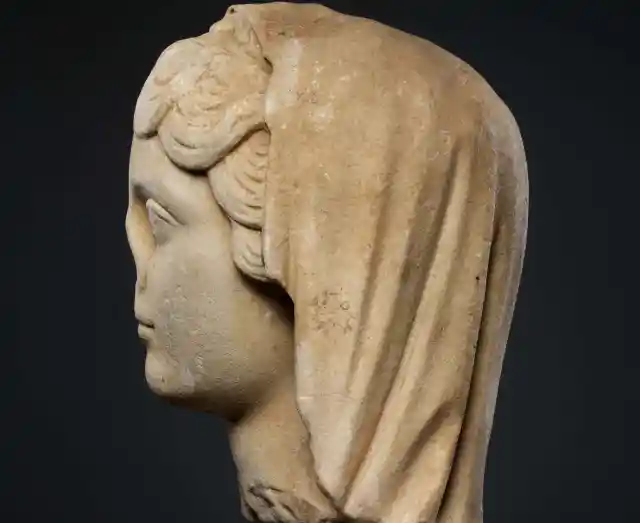

22. She made her marriage a joke
During Roman society, the arts, including comedic theater, held significant importance. Mocking current events was a common practice in these comedies, but an uncomfortable situation arose during a specific performance attended by Aurelius.
The performance used a pun to mock the marriage between Faustina and Aurelius, possibly suggesting the empress's continuous unfaithfulness. However, there were additional factors involved.


23. He was scared for Aurelius’s health
Faustina's actions posed a threat not only to her husband's reputation, but also to his authority. In 174, her husband fell seriously ill, possibly due to ulcers.
Regardless of the cause, Faustina was deeply worried about Aurelius' deteriorating health, to the point where she reportedly made a decision of grave betrayal.


24. Maybe she was a traitor
Despite her husband's declining health, there are reports suggesting that she orchestrated a rebellion against his rule. It is claimed that she smartly supported Roman general Avidius Cassius, who later declared himself emperor based on a false report of Aurelius' demise.
Faustina's reputation led many to think about a possible romantic relationship with the general. However, it is possible that her motives, for once, were more honorable in order to save the falling reign.


25. She wanted to protect her kids
During the revolt, Faustina's concern for her thirteen-year-old son, Commodus, who was the next heir to the empire, was evident.
She feared for his safety in the absence of a trustworthy emperor, which led her to support Cassius. However, in her desperation to maintain power, she made a harsh decision.


26. A miracle recovery
Cassius held power in Rome for approximately three months until an unexpected turn of events occurred. Surprisingly, Aurelius made a remarkable recovery and commanded the removal of Cassius from his throne.
Furious with the betrayal, Aurelius declined to lay eyes on Cassius' severed head and had it interred. In truth, if the rumors were accurate, Faustina should have suffered a similar deadly fate as her vanquished lover.


27. She got away smoothly
After Cassius died, letters were discovered where Faustina condemned him as a traitor and demanded his punishment. These letters were believed to be her innocence, and as a result, Faustina and her husband were able to regain their grand status in Roman society.
However, it was unfortunate that the very son she had fought to defend eventually became a source of trouble for her, a situation that she may have predicted.
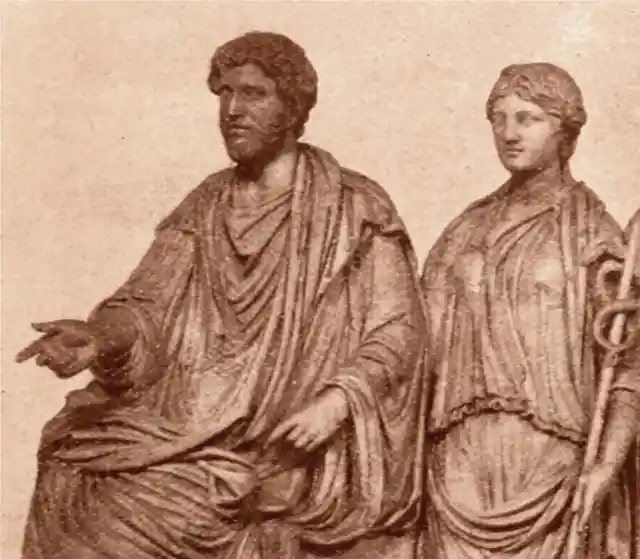
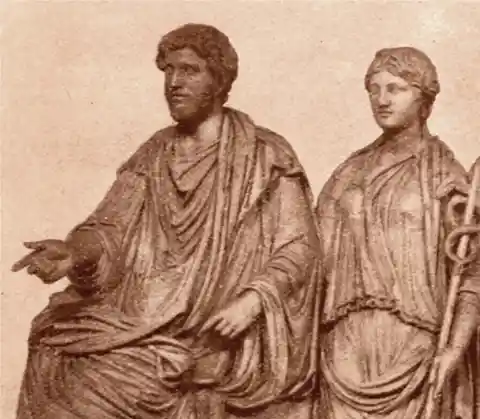
28. Her nightmare became her reality
Faustina had an astonishing dream during her pregnancy with the future Roman heir. In her dream, she gave birth to two snakes instead of infants, and it was evident that one snake had greater power than the other.
In reality, Commodus was born as a twin and surpassed his brother in life, eventually rising to the position of the Roman emperor. It is possible that Faustina should have realized then that Commodus would bring trouble. However, she could not have predicted the extent of his madness.


29. The consequences of her promiscuity
According to the rumors, Faustina was known for her past and her lovers, causing locals to closely examine the appearances of her children to determine their true father, who was the emperor.
Being the heir, Commodus faced even more scrutiny due to one of Faustina's well-known controversial actions.


30. People doubted Commodus
The legitimacy of Commodus, the son of the emperor, was doubted by the people of Rome. There were even suspicions that he might be the son of a famous Roman gladiator (more details about him will be discussed later).
Although these suspicions were never confirmed, Commodus' unforgivable actions only added fuel to the rumors.


31. The true mad king
Faustina's son gained a reputation for his aggressive, cruel, and rude nature, even during his childhood. According to a legend, he once commanded the execution of his servant for providing him with a bath that wasn't adequately warm.
It comes as no shock that people believed he was the child of the violent gladiator. Commodus' ignorant and inhuman conduct ultimately left a lasting mark on his family and the entire Roman empire.


32. She didn’t raise him well
The period of peace in Rome came to an end during Commodus' reign due to his terrible rule. Historians noted his obsession with portraying himself as a gladiator, which raised suspicions about his leadership abilities.
Faustina, the mother of the Roman heir, evidently did not succeed in properly raising him. And if failing to raise her son wasn’t enough she faced challenges in raising her daughter too.


33. She was against Lucilla’s marriage
Faustina passionately opposed her daughter, Lucilla's, second marriage. Although the exact reasons for her disapproval are unknown, Faustina may have believed that Lucilla's chosen partner, Claudius Pompeianus, lacked sufficient social standing to be her daughter's husband.
Nevertheless, disregarding Faustina's opinion, the couple proceeded to marry under the command of Lucilla's husband. Despite the numerous scandals and doubts surrounding Faustina, she nonetheless maintained a prominent position as an empress, earning numerous titles.


34. The gained the title of “ Augusta ”
Before Faustina became engulfed in scandals, she received the esteemed title of "Augusta" from Roman society in 147 AD. Despite being a young teenager at the time, she had already married Aurelius.
It is possible that her ability to bear children played a role in this recognition, but she also made sure to accumulate additional acts of kindness.


35. She supported her husband
Similar to the previous empresses, Faustina accompanied her emperor spouse during his rule, participating in numerous wars. Regardless of scandalous gossip, Faustina remained loyal to her husband during these hard periods.
Her ability to enchant men was evident, as she left a profound impact on the laborers she encountered during her extensive journeys.


36. She was admired
It is undeniable that Faustina relished the admiration and affection she received from the men in the armies while accompanying Aurelius.
The soldiers held such a deep affection for her that they affectionately called her the "mother of the camp". Aurelius himself was also deeply impressed by her abilities and considered her to be a suitable companion.


37. Aurelius commended his wife
The history books portray Faustina's husband as a competent and thoughtful leader, in stark contrast to the scandalous rumors surrounding Faustina's actions.
Nevertheless, there appeared to be a unique bond between them, as Aurelius himself commended his wife, describing her as "obedient, loving, and genuine" in his personal documentation. However, the Empress did not receive the same level of kindness from other members of her family.


38. Her aunt tricked her out of money
Being part of the Roman upper class, Faustina had high hopes of inheriting a substantial amount of money upon her great aunt's death. Nevertheless, her aunt seemed to have some issues with her niece and made an unexpected choice regarding her wealth.
Rather than leaving it to Faustina, the rightful successor, it was rumored that she gave her fortunes to some acquaintances who were also her companions. And as expected this news did not sit well with Faustina.


39. She held her head high
Faustina had the option to claim her inheritance, yet she chose not to. Her excessive pride prevented her from doing so. According to reports, she avoided appearing greedy and instead opted to uphold her reputation.
She even declined to purchase any of her aunt's valuable jewelry during the estate's last auction. This sense of image consciousness persisted within the empress until the very end.
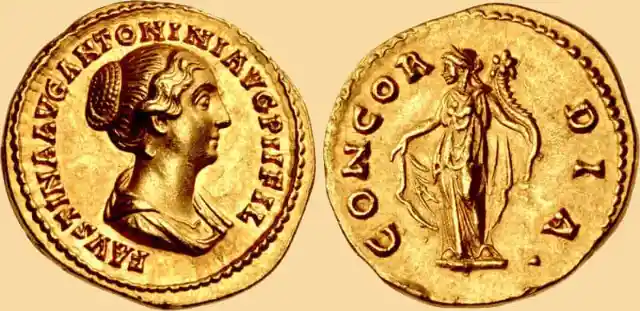

40. She was by Aurelius’s side when she died
Despite being regarded as a good and peaceful ruler by historians, Aurelius's reign over Rome was marred by numerous wars. One such conflict in the East resulted in the sudden death of his wife, Faustina, while she was by his side.
Her life was covered in rumors and ambiguity, and her demise remained equally mysterious, if not more so.


41. Her death was a mystery
Scholars and historians are still divided on the reason behind the empress' death. Certain accounts suggest that she died naturally, while others assert that she may have ended her own life, possibly to conceal additional misconduct.
However, a more intriguing theory arises, suggesting that her past may have ultimately confronted her resulting in her end.
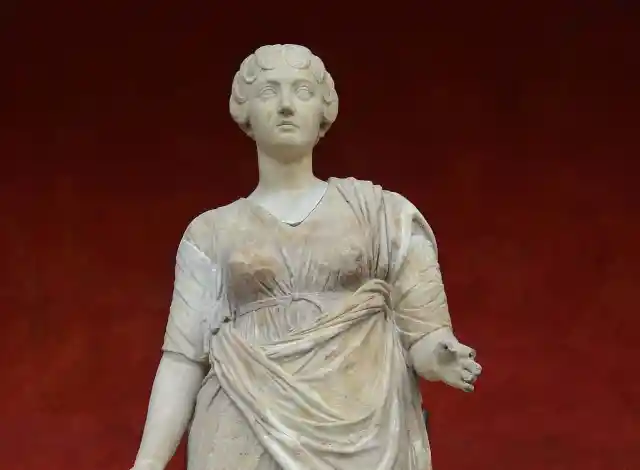

42. Her past caught up with her
Faustina's reign as empress was marked by numerous questionable decisions, but none were as severe as her supposed endorsement of the man who attempted to overthrow her husband's rule. Reports suggest that the empress was killed by vengeful individuals due to her romantic association with the traitor, Cassius.
Given the uncertainty surrounding her life, it is difficult not to hold suspicions about the circumstances of her demise. However, despite the suspicious circumstances, her husband made significant efforts to portray her as a respected and honored woman.


43. She was loved
Faustina's husband appeared deeply saddened by her death. Following the Roman tradition, rulers had the authority to deify respected individuals upon their demise, and Aurelius wasted no time in doing so for his wife.
He announced her as a goddess and constructed temples in her name. This gesture alone would have sufficed, but he went beyond expectations by taking further action.


44. Faustinopolis
In honor of Faustina, Aurelius decided to change the name of the place where she passed away to Faustinopolis. Additionally, her admirers constructed the Baths of Faustina in Greece as a tribute to her, and to this day they bear her name.
Surprisingly, this controversial empress managed to establish a respectable reputation for herself after all. Continuing this gesture, her husband continued to assist others in her name.


45. Charitable funds by her name
After the death of Faustina's mother, her father was deeply touched by her life and devotion. In honor of her, he established a charitable fund for the underprivileged girls in Rome. This act of Faustina's father inspired Aurelius to do something similar in memory of his own wife.
In fact, he decided to enhance the fund even more. Aurelius went to great efforts to honor his wife, which is why his subsequent actions, or rather his inability to take any action, were understandable.


46. Her husband truly loved her
Despite having the right to remarry after Faustina, Aurelius chose not to do so. It is possible that he genuinely loved Faustina and believed that he would never find a love like that again. However, there are reports suggesting that he was concerned about how a new wife would treat his children.
Therefore, he remained single for the duration of his reign after Faustina's departure. It is worth considering who could possibly rival Faustina, especially considering the story of her most scandalous affair, which has yet to be discussed.


47. She swooned over a Roman gladiator
One of Faustina's most infamous alleged love affairs involved a prominent Roman gladiator. This scandalous news quickly spread and fueled gossip, as gladiators in Rome were seen as symbols of strength, taboo, and undeniable strength.
It is understandable to sympathize with the anger of a betrayed husband. However, it is said that Faustina's husband, the Roman Emperor, responded with potentially dangerous anger.


48. He executed the gladiator
According to legend, Faustina's husband sought guidance from astrologers. These mystical advisors provided a solution for Aurelius to both punish his wife and put an end to her infidelity.
As a result, he commanded the execution of the gladiator, possibly through one of Rome's various brutal execution methods practiced at that time. With her lover now deceased, Faustina's suffering had only just commenced.


49. A way to her cleanse
Aurelius commanded Faustina to immerse herself in the blood of her lover who had been executed. It was believed that this action would cleanse her of her desires and transform her into the devout Roman Royal she was destined to be.
However, the horror did not end with bathing in blood; it was merely the beginning of a twisted solution. The situation became even more disturbed.


50. Couldn’t suppress her inner fire
The last stage of Faustina's purification elevated the creepiness level of the entire process. Following a bath in her lover's blood, Faustina's husband commanded her to engage in sexual intercourse with him, as per reports. Another version of the story presents a different order of events, where he compelled her to sleep with the gladiator and murdered him during the act, while bathing his wife in the gladiator's blood.
Despite the disturbing nature of this entire incident, it appeared to have no effect in suppressing Faustina's intense passions and desires.
